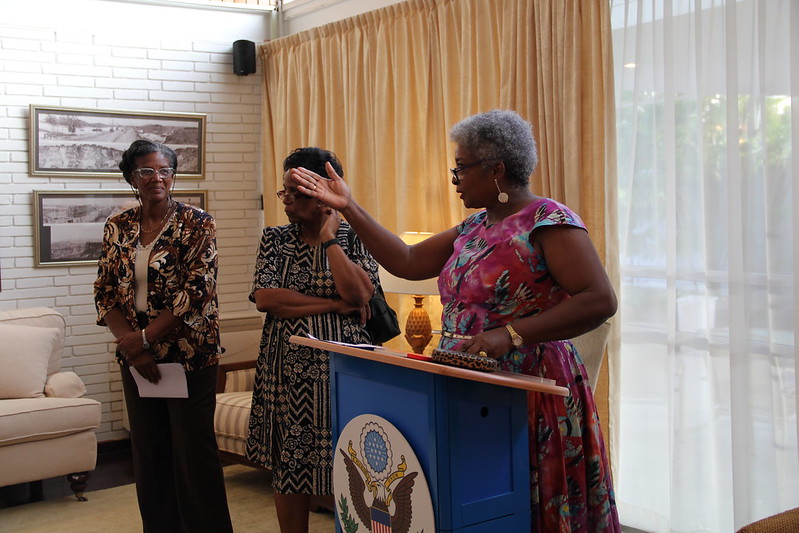Gender Advocacy in Suriname
 Suriname is a developing country located just above the equator in northern South America, though it is also part of the Caribbean Community. Dutch colonial governance defined its history, but the nation gained independence in 1975. Despite its small size, the country is famous for its plentiful natural resources and vast rainforest cover. As one of the U.N.’s Sustainable Development Goals (SDGs), gender equality is an important point of action for Suriname due to its links to poverty reduction and economic growth. In 2022, the Ministry of Home Affairs held a brainstorming session on how the nation could address SDG 5 to “achieve gender equality and empower all women and girls”. This drew out equal economic participation, gender issues at work and respect for women’s voices as key to a sustainable future.
Suriname is a developing country located just above the equator in northern South America, though it is also part of the Caribbean Community. Dutch colonial governance defined its history, but the nation gained independence in 1975. Despite its small size, the country is famous for its plentiful natural resources and vast rainforest cover. As one of the U.N.’s Sustainable Development Goals (SDGs), gender equality is an important point of action for Suriname due to its links to poverty reduction and economic growth. In 2022, the Ministry of Home Affairs held a brainstorming session on how the nation could address SDG 5 to “achieve gender equality and empower all women and girls”. This drew out equal economic participation, gender issues at work and respect for women’s voices as key to a sustainable future.
Gender advocacy in Suriname has come in various forms, from promoting women’s job opportunities to increasing their political representation. The country has made progress, such as increased labor force participation from 41.4% in 2011 to 44.3% in 2022. However, the World Bank also found that behind such statistics, nine in every 50 women aged 15-49 are in vulnerable employment positions, as of 2022.
Economic Opportunities
One important aim for the country is setting women up for economic success, uplifting women out of poverty and instilling financial stability. The Ministry of Home Affairs has targeted this by establishing its 2021-2035 Gender Vision Policy. This highlighted sector disparities, unequal access to economic resources and difficulties in women accessing formal work. Its answer to these issues was gender mainstreaming, allowing the application and monitoring of gender-responsive policies across departments.
While the full success of this vision is yet to be seen, the agricultural sector has already seen an increase in female participation from 4.65% in 2011 to 5.68% in 2022, according to the World Bank.
Women’s Economic Empowerment (WEE), which is a program that focuses on supporting women-owned businesses in Suriname, also advocates for women’s professional development. The project is part of the Suriname Energy, Oil and Gas Summit and originated in 2023. It aims to achieve gender advocacy by boosting the participants’ pitching, leadership and networking skills to empower women working in the sector.
Legal and Political Representation
Gender equality is established on a basic level in the Surinamese Constitution, as Article 35 declares that “Man and woman are equal before the law,” according to the Gender Vision Policy document. The Gender Vision Policy aims that beyond this “all legislation will have been adapted, strengthened and approved and implemented to promote gender equality and to eliminate gender-related discrimination.” In particular, this will involve intersectionality to address the discrimination against Indigenous women, promotion of equal pay and prevention of forced marriages.
Hope for the achievement of these aims can be inferred from the increasing political representation of women in Suriname. From 2011 to 2022, the proportion of seats held by women in national parliaments has increased from 11.8% to 29.4%, according to the World Bank.
However, men still hold over double as many seats in parliament as women, so closing the gap is a long-term priority for the country.
Women’s Health
Menstrual and reproductive health are vital points of action for gender advocacy in Suriname. Addressing these issues allows women and girls to reach their full potential. As a part of this, the American Medical Women’s Association (AMWA) has been working in Suriname on its mission to improve women’s health. Launched in 2021, its initiative to end period poverty has involved the provision of period pad kits. The First Lady of Suriname also received one of these kits in 2023. The Ministry of Public Health in Suriname has also addressed women’s health via a workshop in 2023 in collaboration with the United Nations Population Fund (UNFPA).
The importance of family planning to gender equality and poverty reduction raised, which is particularly relevant when the country’s contraceptive prevalence dropped from 47.2% in 2010 to 38.7% in 2018, according to the World Bank. The workshop showed positive aims for practical engagement, empowerment of women and raising awareness of their options.
Gender Advocacy in Suriname: Final Thoughts
Suriname currently scores 77 out of 100 in an index rating on the life cycle of a working woman, according to the World Bank. While progress in employment and politics has been significant, family commitments and social norms still hold women back. Gender advocacy in Suriname must maintain its diverse range of aims as well as the uniting principles of equality and empowerment.
– Daisy Outram
Daisy is based in Kent, UK and focuses on Good News for The Borgen Project.
Photo: Flickr
